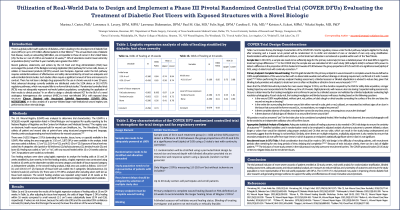Clinical Research
(CR-006) Utilization of Real-World Data to Design and Implement a Phase III Pivotal Randomized Controlled Trial Evaluating the Treatment of Diabetic Foot Ulcers with Exposed Structures with a Novel Biologic.

The FDA Biologics Licensing Application (BLA) process requires substantial evidence of effectiveness and safety of a new therapeutic. Randomized Controlled Trials (RCTs) may not adequately represent real world patient populations. An in-silico analysis of real-world Diabetic Foot Ulcer (DFU) patients with exposed structures (Wagner 2; Texas Grade IIIa) collected in a nation-wide wound registry was performed to design a Phase III pivotal trial for the BLA of a novel biologic.
Methods:
Analysis of the outpatient-based US Wound Registry, which began data collection in 2005, of Wagner 2 DFUs voluntarily reported by treating centers was performed to determine relevant wound and patient characteristics to determine relevant primary, secondary, and tertiary endpoints, as well as inclusion and exclusion criteria for an IRB approved Phase III pivotal trial.
Results:
5,875 patients from over 1200 sites were included in the analysis. Dependent variables for wound closure within 24 weeks of treatment initiation included wound size greater than 4cm2 and wound depth including exposure of deep structures such as a tendon, muscle, and bone. 20% of Wagner 2 patients had bone exposed. Patients were a median age of 61 years old, majority male, and had a race and ethnicity distribution analogous of the US population, which are often underrepresented in RCTs. Toes are the most common location (43.3%), followed closely by the midfoot (38.5%). The most common co-morbidity was hypertension (78.8%) followed by obesity (72.0%). The Phase III trial will compare the efficacy and safety of an Autologous Heterogeneous Skin Construct (AHSC) with standard care vs. standard care alone in 100 patients randomized 1:1 across 20 sites.
Discussion:
Real-world data was used for the design of a Phase III pivotal trial of an accepted open Investigational New Drug (IND) application for the BLA of a AHSC (NCT05372809). Utilization of real-world data to design trials relevant to practitioners may be beneficial for RCT design and implementation.
Trademarked Items: US Wound Registry. AHSC = SkinTE. The trademark SkinTE was not used in the abstract.
References:

.png)